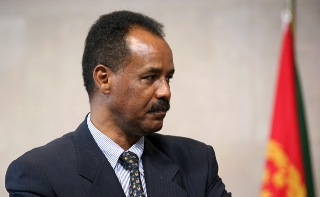Eritrea’s president breaks silence over army mutiny incident
By Tesfa-Alem Tekle
February 10, 2013 (ADDIS ABABA) – Eritrean president Isaias Afewerki on Friday spoke for first time about last month’s mutiny incident in Asmara after remaining silent for three weeks.

The mutiny was the latest challenge to the Eritrean president and while admitting the incident occurred, Afewerki urged his people not to worry.
“The 21 January 2013 incident was, and is no cause at all, for apprehension and that the government opted to remain silent regarding the matter so as to give no ground for the authors of sheer lies,” Afewerki told the state news agency ERINA.
He added, “Entertain no worry at all, as there was – and does not exist – any reason for being apprehensive”.
He went on to say that the government of Eritrea deemed it appropriate to refrain from issuing statements on the matter in haste, as doing so was not only outside of its political culture but also would also mean “serving the ploys of [a] bankrupt enemy quarters”.
Afewerki said the government would release further necessary information when the appropriate time arrives, but provided no other details.
Sudan’s president Omar al-Bashir was the first head of state to pay a visit to Eritrea after the mutiny.
Bashir paid a one-day visit to the capital Asmara on 26 January – just few days after the mutiny – where he held talks with his Eritrean counterpart on a number of issues, including the mutiny incident, as well as common concerns regarding peace and security.
Eritrea is one the world’s most politically most repressive nations. It is one of Africa’s foremost jailers of journalists and was ranked last in Reporters Without Borders’ (RWB) latest press freedom index of 179 countries.
Recently, the Eritrean government blocked access from Asmara to the Qatari TV news network Al Jazeera.
On 1 February the information ministry issued a decree strictly warning all citizens to refrain from providing access to Al Jazeera, particularly targeting public places such as restaurants, cafés and hotels.
The Eritrean authorities were reportedly angered by Al Jazeera after the TV station gave coverage to demonstrations held by exiled Eritreans in solidarity of the mutinous soldiers.
The government has also jammed Al Jazeera’s English language channels.
On Tuesday, RWB deplored the Eritrean government’s censorship against Al Jazeera.
“In a country with no privately-owned media and where national news broadcast in the local language is strictly controlled by the government, the foreign media are only ‘tolerated’ and it is clear that the line that cannot be crossed is coverage of Eritrean news,” RWB said.
OPPOSITION VOICE
Nothing is yet known of the fate of the dissident soldiers and it remains unclear if the mutineers had actually formally surrendered.
However, in an interview with Sudan Tribune on Sunday, chairman of the opposition Democratic Front for Eritrean Unity, Tewolde Gebre Sellasie, alleged that the Eritrean government is arresting regional officers and others.
On 23 January following the failure of the mutiny, he said, the interior ministry of the regime – with the approval of the president – declared to take action on those who oppose the regime under the cover of religious extremists.
According to him, Abdullah Jabir – general-secretary of the ruling Popular Front for Democracy and Justice (PFDJ) and Mustafa Nur Hussein – governor of the southern region, were arrested.
The opposition official said although the general situation in Eritrea seems calm in certain areas, within the rank and file of the army, those who refused to disarm are resisting, with periodic clashes and skirmishes taking place in various areas.
“The situation is not fully stable, and the president is in continuous fear, terrorised from the people and the army,” Tewolde told Sudan Tribune.
He said the situation in Eritrea will not return to the way it was in the past and believes revolution is not far away from happening in the country.
“Now the fear psyche gradually is breaking, and people are emboldened to stand against the regime. Therefore, now and then, we [can] expect unrest, either from within the army or the people,” he added.
(ST)
